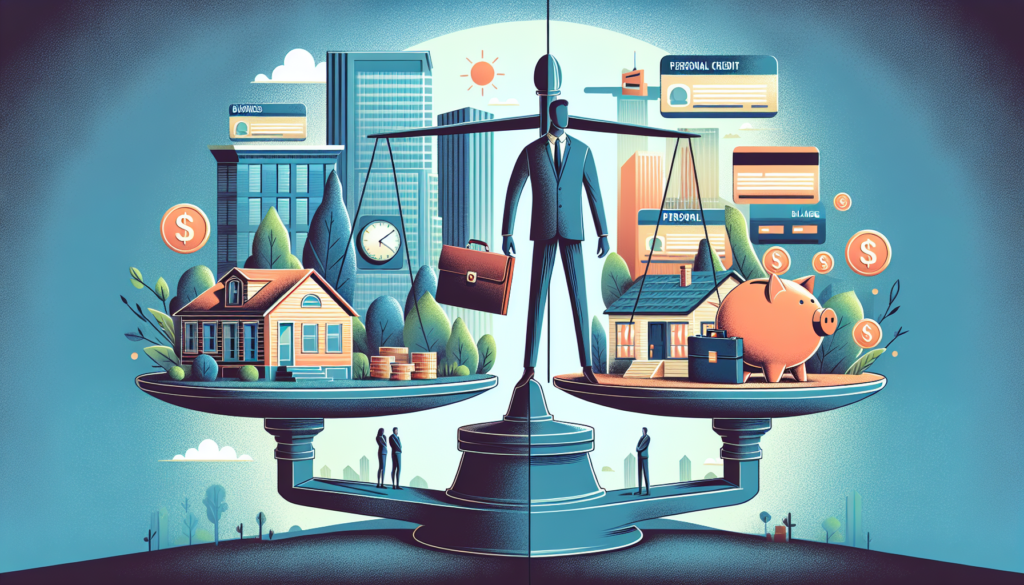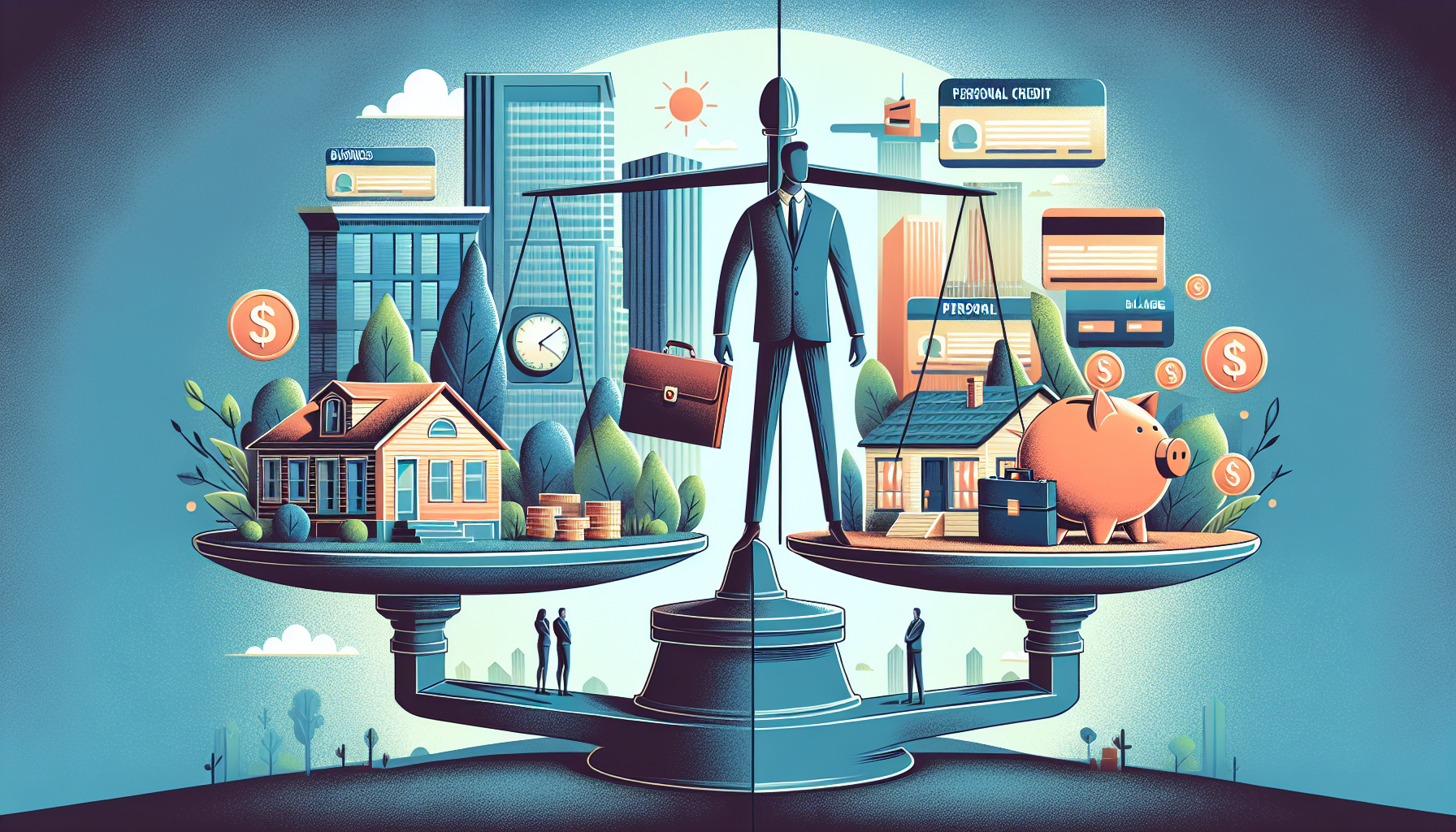Have you ever wondered about the differences between business credit and personal credit? Understanding these distinctions is essential for anyone interested in starting or expanding a business. While personal credit focuses on an individual’s financial history and behavior, business credit evaluates the creditworthiness of a company. In this article, we will explore the unique aspects of both types of credit and discuss why it is crucial to establish and maintain a separate credit profile for your business.

What is Business Credit
Definition
Business credit refers to the creditworthiness of a business entity, separate from its owners or operators. It is a way for lenders and financial institutions to assess the risk associated with extending credit to a business. Unlike personal credit, which is connected to an individual’s financial history and personal assets, business credit evaluates a company’s financial stability, payment history, and overall creditworthiness.
Purpose
The purpose of business credit is to provide a clear evaluation of a company’s ability to manage its financial obligations. It plays a crucial role in determining whether a business can access loans, lines of credit, trade credit, and other forms of financing. Furthermore, business credit also impacts the interest rates and credit limits that lenders are willing to offer. Establishing and maintaining a strong business credit profile is vital for businesses looking to grow and thrive.
Importance
Having strong business credit carries several advantages. Firstly, it allows businesses to separate their personal and business finances, protecting personal assets from business liabilities. Additionally, it enhances a company’s credibility and reputation in the eyes of suppliers, vendors, and potential partners, increasing opportunities for better trade terms and partnerships. Moreover, a solid business credit history can lead to more favorable financing options and terms, enabling businesses to secure loans and credit at more affordable rates.
What is Personal Credit
Definition
Personal credit refers to the creditworthiness of an individual, based on their personal financial history, credit utilization, and payment behavior. It is an assessment of an individual’s ability to manage their personal finances and fulfill their financial obligations. Personal credit is commonly used by lenders, creditors, and financial institutions to determine the level of risk associated with lending money or extending credit to an individual.
Purpose
The purpose of personal credit is to provide insights into an individual’s financial responsibility, indicating whether they are likely to repay debts on time. By assessing credit scores and credit reports, lenders can make informed decisions about loan approvals, interest rates, credit limits, and other financial services for individuals. Personal credit is an essential factor in various aspects of life, such as obtaining mortgages, auto loans, credit cards, and even securing employment or rental agreements.
Importance
Maintaining good personal credit is crucial for individuals looking to achieve financial stability and access various opportunities. It allows individuals to qualify for favorable interest rates and loan terms, making borrowing more affordable. Additionally, a strong personal credit history reflects responsible financial behavior and can lead to better insurance rates and rental terms. Moreover, it can positively impact job prospects, as certain employers consider an individual’s creditworthiness when making hiring decisions.
Legal Separation
Business Credit and Personal Credit
One fundamental aspect that distinguishes business credit from personal credit is the concept of legal separation. Business credit focuses solely on the creditworthiness of the business entity itself, rather than the owners or operators of the business. This means that even if an individual has excellent personal credit, it does not necessarily translate to strong business credit for their company. Each entity is evaluated independently, considering its financial performance, payment history, and other relevant factors.
Limited Liability
Another crucial aspect of legal separation is the concept of limited liability. Business entities, such as corporations and limited liability companies (LLCs), offer personal liability protection to their owners. This means that personal assets of the business owners are generally shielded from the business’s debts and legal liabilities. However, maintaining strict separation between personal and business finances is essential to preserve this limited liability protection.
Separate Credit Scores
Business credit and personal credit are evaluated through separate credit reporting systems. While personal credit scores are typically determined by credit reporting agencies like Experian, Equifax, and TransUnion, business credit scores are calculated by specialized agencies such as Dun & Bradstreet, Experian Business, or Equifax Small Business. These agencies collect and analyze data specific to business credit, including payment history with suppliers and vendors, trade credit utilization, and overall financial health.

Ownership Structure
Business Entities
Different ownership structures define how a business is legally organized. The chosen structure has implications for liability, taxation, and the way credit is extended and evaluated. The most common types of business entities are sole proprietorships, partnerships, limited liability companies (LLCs), and corporations.
Sole Proprietorship
A sole proprietorship is the simplest form of business ownership, where an individual operates a business without forming a separate legal entity. In this structure, the individual and the business are considered one entity from a legal and credit perspective. Therefore, personal credit plays a significant role in determining creditworthiness and accessing financing.
Partnership
In a partnership, two or more individuals join forces to run a business. Similar to a sole proprietorship, personal credit is often a significant factor in assessing creditworthiness. However, it is essential to establish clear agreements and legal documentation to separate personal and business liabilities in case of a partnership.
Limited Liability Company (LLC)
An LLC provides personal liability protection to its owners, known as members. This means that the personal assets of the members are generally safe from the company’s debts and obligations. Creditworthiness for an LLC is primarily based on the business’s financial history and its ability to meet its financial obligations.
Corporation
A corporation is a separate legal entity from its owners, known as shareholders. This means that the corporation assumes liability for its debts and legal liabilities, protecting the personal assets of the shareholders. Credit evaluation for a corporation focuses primarily on the company’s financial performance, payment history, and overall creditworthiness.
Credit Evaluation Criteria
Business Credit
When evaluating business credit, several key factors are considered. Lenders and credit providers assess the business’s payment history, credit utilization, industry risk, trade references, and financial stability. They also take into account the business’s financial statements, such as income statements and balance sheets, to gain insights into its financial health and ability to repay debts.
Personal Credit
Personal credit evaluation primarily revolves around an individual’s credit score, which is derived from their credit history, credit utilization, payment history, and length of credit history. Lenders and credit providers also consider an individual’s debt-to-income ratio, employment history, and stability, as well as any negative marks on their credit report, such as bankruptcies or foreclosures.
Credit Reporting Agencies
Business Credit Reporting
Business credit reporting agencies collect and analyze data related to a company’s creditworthiness. Dun & Bradstreet, Experian Business, and Equifax Small Business are among the leading credit reporting agencies that compile business credit reports. These reports typically include information about a company’s payment history, credit utilization, legal filings, and public records.
Personal Credit Reporting
Personal credit reporting agencies, such as Experian, Equifax, and TransUnion, gather individuals’ credit information to generate credit reports. These reports consist of personal identifying information, credit accounts, payment history, outstanding debts, and any negative marks like late payments or collections. Individuals can access and review their reports to ensure their accuracy and take necessary steps to improve their credit if needed.
Credit Scores
Business Credit Scores
Business credit scores are numerical representations of a company’s creditworthiness. They are derived from various factors, including payment history, credit utilization, available credit, payment patterns, industry risks, and financial stability. The most commonly used business credit scores are Dun & Bradstreet’s Paydex score, Experian’s Intelliscore, and Equifax’s Business Credit Risk Score.
Personal Credit Scores
Personal credit scores, such as FICO scores, are numerical values that indicate an individual’s creditworthiness. They are based on credit reporting agencies’ evaluations of credit history, payment behavior, credit utilization, length of credit history, and other relevant factors. Higher credit scores generally indicate a lower risk of default and a higher likelihood of obtaining favorable credit terms.
Credit Limits and Interest Rates
Business Credit
Business credit limits and interest rates depend on various factors, including the company’s credit history, payment behavior, financial strength, and industry risk. Businesses with strong business credit profiles are more likely to access higher credit limits and secure loans at lower interest rates, as they are considered less risky borrowers.
Personal Credit
Similarly, personal credit limits and interest rates are determined based on an individual’s creditworthiness. A higher personal credit score typically results in higher credit limits and lower interest rates. Individuals with lower credit scores may face lower credit limits and higher interest rates due to the perceived risk associated with their credit history.
Risk Assessment
Business Credit
Evaluating the risk associated with extending credit to a business involves assessing factors such as industry risks, payment history, financial stability, and overall creditworthiness. Lenders and credit providers consider the potential for economic downturns, market volatility, and industry-specific risks when determining the risk level associated with a particular business.
Personal Credit
Risk assessment for personal credit involves analyzing an individual’s credit history, payment behavior, and financial stability. Factors such as the individual’s debt-to-income ratio, employment history, and stability are also taken into consideration. Lenders and credit providers assess the likelihood of repayment and evaluate the individual’s overall financial responsibility.
Impact on Financing
Business Credit
Having established business credit is crucial for businesses seeking to obtain financing. A strong business credit profile can significantly impact a company’s ability to secure loans, trade credit, lines of credit, and even leases. It also plays a significant role in negotiations for favorable interest rates and credit terms. Businesses with poor or no business credit may face difficulties in accessing financing options or may be limited to higher interest rates and less favorable terms.
Personal Credit
Personal credit history heavily influences an individual’s ability to secure financing. Access to mortgages, auto loans, personal loans, and credit cards can all be affected by an individual’s personal creditworthiness. Individuals with strong personal credit profiles generally find it easier to obtain favorable interest rates, loan approvals, and credit limits. Those with poor personal credit may face limitations and higher interest rates when seeking financing options.
In conclusion, business credit and personal credit are distinct entities that serve different purposes and evaluate creditworthiness from separate perspectives. Establishing and maintaining strong credit profiles in both areas is essential for businesses and individuals alike. By understanding the differences and importance of business credit and personal credit, individuals and businesses can better navigate the realm of credit evaluation, access financing opportunities, and ultimately achieve their financial goals.

